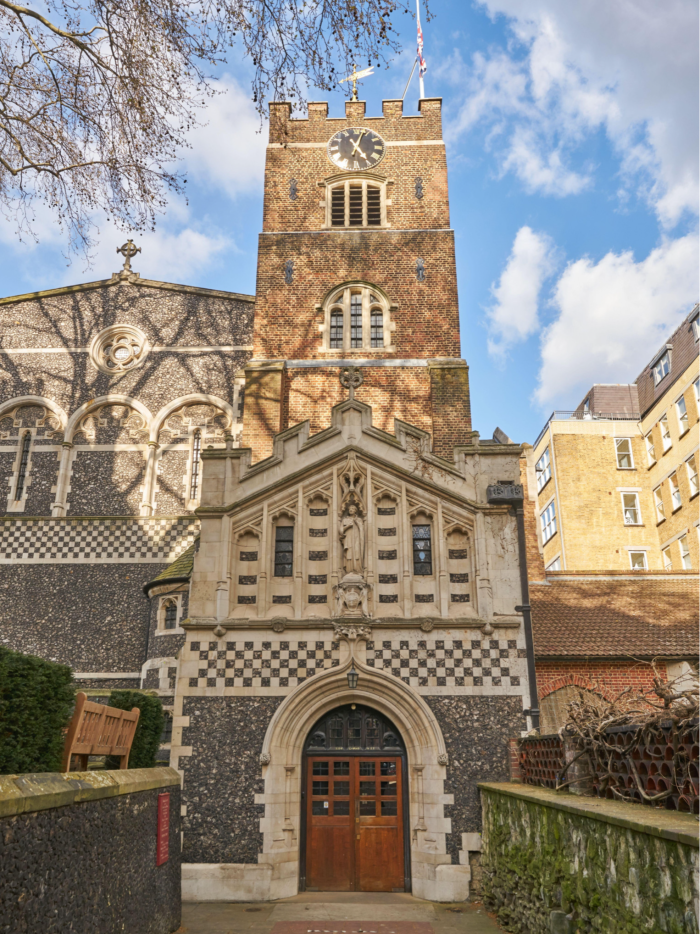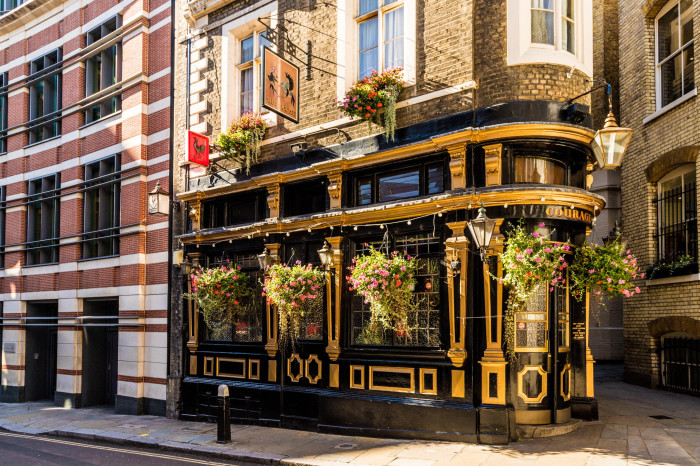A rare find: Lost Property hotel, St Paul’s

[ad_1]
This article is part of FT Globetrotter’s guide to London
Look right as you step out of the Lost Property hotel, and you’re confronted with one of London’s great views: the mighty Baroque cliff that is the west front of St Paul’s Cathedral, with its sweep of steps, its twin towers, its double deck of columns, its apostles and evangelists balanced giddily on top.
Lost Property, part of Hilton’s Curio Collection, is a brand-new building, developed over six years at a cost of £100mn by property group Dominvs, but it hides behind an 1885 facade. This close to Christopher Wren’s masterpiece, no one, least of all the City of London’s planning officers, wants to monkey with the streetscape.
Once through the door, however, you are firmly in 21st-century boutique-hotel land. Behind the reception desk, lit by a cluster of lights in wavy, brightly coloured Murano lampshades, is a bas-relief of miscellaneous London highlights, including Bank station, Churchill’s War Rooms and the British Museum (complete with what looks worryingly like the Nefertiti Bust, though that’s in Berlin). There are also inspiring quotes from Churchill — though not, alas, “I have nothing to offer but blood, toil, tears and sweat”, which could rattle the weary traveller.


Depending on the time of day, and on their preferred pick-me-up, that traveller could either turn right into Tattle, a coffee shop, or head left down a corridor and into Found, the long and lofty bar and restaurant at the back of the property. This is a very pleasant space, which, like Tattle, is open to passing customers, though on the Monday night my wife and I dined there, it didn’t seem to be attracting many: we were one of only two couples, plus two or three solitary men — business travellers, I guess, who had just a main course while staring intently at their mobile phones. (Is there a comfortable way to dine alone in a restaurant?)
Found deserves to get more of a crowd: the dishes my wife and I tried were excellent, including a flawlessly juicy slab of steak and a prawn cocktail that achieved a perfect balance of rich dressing, firm seafood and crunchy lettuce. Admittedly, the more alcoholic cocktails we’d had beforehand may have helped; served in a tulip glass, my Found in the City was a sherbet-y concoction with a definite kick.
Upstairs, the rooms (there are 145) are compact but comfortable, with neutral walls and deep-blue or deep-red furnishings for even-numbered and odd-numbered floors respectively. Picking up the “lost and found” theme that runs tirelessly throughout the hotel, the mirror was engraved with the words “Not all lost things should be found” — a vaguely troubling sentiment for anyone checking their appearance.


Our fifth-floor deluxe king did not have a bath, but the marble shower room was spacious and full of natural light. The Penhaligon’s Quercus toiletries come in refillable pump dispensers, which is good news for the planet — albeit on a nano-scale — and bad news for cheapskates hoping to top up their domestic shampoo supply.
While some rooms have views of St Paul’s, ours didn’t but, across the rooftops, we could see the chimney of Bankside Power Station — aka Tate Modern — plus the tower of St Andrew by the Wardrobe and the wedding-cake spire of St Bride’s.


In fact its location is one of its strengths: Lost Property is poised between two bustles, that of the City’s financial heart and that of the West End, and although it’s handy for such tourist must-sees as St Paul’s and Tate Modern, the area also abounds in oddities: a few minutes north, for example, up Giltspur Street, is the Golden Boy of Pye Corner, a chubby gilt statue on a wall-mounted plinth that marks the limit of the 1666 fire. “This Boy is in Memmory Put up for the late FIRE of LONDON Occasion’d by the Sin of Gluttony 1666” runs the inscription. Nearby, tucked behind a Tudor gatehouse, is St Bartholomew the Great, spared from the fire and one of the City’s loveliest churches.
Immediately to the south of the hotel is Carter Lane, a surprisingly peaceful street this deep in London, very pleasant for a stroll and a coffee; of the several options here, my favourite is the tiny, low-key Grace St Paul’s, with its big windows, bracing espressos and superior snacks. There are good pubs here too, of which The Cockpit, a black and gilt 1860s establishment just down St Andrew’s Hill, is a congenial venue for an alfresco summer pint.

Breakfast the next morning was something to savour too: we opted for the buffet, with mounds of full English bacon and eggs, plus cold cuts, toast, yoghurt and fruit. At the table behind us a man and woman talked digital business; across the room was a man with a couple of kids. Lost Property seems a reasonable call equally for those on business and those at leisure. Did someone say “bleisure”? No one should say “bleisure”.
After a lot of breakfast — my inner backpacker cannot resist maxing out on these things — we checked out and I headed up Ludgate Hill, back to the office: a routine task lifted by the luxury of having Wren’s cathedral on my temporary doorstep. Despite its whimsical name, Lost Property has one of the most findable addresses in London.
-
Good for: Location, location, location
-
Not so good for: Scenesters. The restaurant receives less attention than it deserves
-
FYI: Found’s set menu is somewhat of a bargain for this part of town (£28 for two courses, or £35 for three)
-
Double: from £223
Neville Hawcock was a guest of Lost Property
Tell us about your favourite City stays in the comments below. And follow FT Globetrotter on Instagram at @FTGlobetrotter
Cities with the FT
[ad_2]
Source



